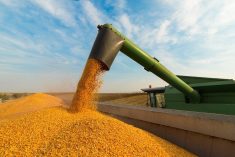Moscow | Reuters—The European Union’s sanctions on vessels transporting Russian grain, along with Turkey’s wheat import ban, impacted Russian grain exports at the end of 2024, the country’s central bank said on Thursday.
The EU sanctioned 79 vessels, including four accused of undermining or threatening “the economic subsistence or food security of Ukraine, such as the transport of stolen Ukrainian grain.”
Russia currently holds about 20 per cent of Ukrainian territory, with the four regions it officially calls “the new territories” accounting for about five per cent of Russia’s total grain harvest, estimated at 130 million metric tons in 2024.
Read Also

Olymel parent company sees increased earnings in 2025
Meat processor Olymel recorded sales of nearly $4.9 billion in 2025 helped by strong pork and chicken markets said parent company Sollio Cooperative Group.
In its balance of payments report, the central bank noted the increasing pressure of Western sanctions on Russian exports, which fell by two per cent in 2024. Russia is the world’s largest wheat exporter.
“The EU has added more than 50 vessels to the sanctions list, which are subject to a ban on entering ports and receiving services, including those transporting grain,” the central bank said.
The EU listed vessels San Damian, San Cosmas, San Severu, and Enisey in the list published on Dec. 16, 2024. Russia-registered Enisey can transport up to 44,000 tons of cargo.
The central bank said Turkey’s ban on wheat imports, introduced following a good harvest and partly to protect farmers from low prices, also played a role. Turkey was a major importer of Russian wheat.
Agriculture Minister Oksana Lut earlier said that Russian grain exports will fall by one-fifth from last season’s record to 57 million tons in 2024-2025, attributing the decline to bad weather.
The share of agricultural products in Russia’s total exports rose to 10 per cent after about 10 years of strong growth in the sector, triggered by Moscow’s ban on food imports from Western countries, imposed in 2014.
—Reporting by Gleb Bryanski














